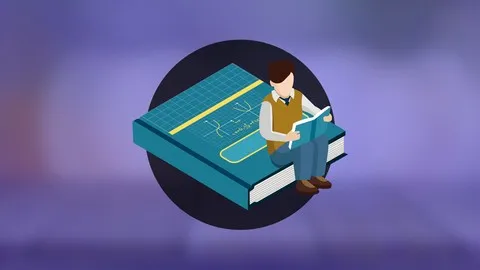
Capstone: Data Science Problem in Linear Algebra Framework 
This course provides an overview of the Capstone project, focusing on the application of linear algebra to solve a data science problem. Students will build and evaluate a regression model, and present their findings to their peers. ▼
ADVERTISEMENT
Course Feature
![]() Cost:
Cost:
Free
![]() Provider:
Provider:
Coursera
![]() Certificate:
Certificate:
Paid Certification
![]() Language:
Language:
English
![]() Start Date:
Start Date:
29th May, 2023
Course Overview
❗The content presented here is sourced directly from Coursera platform. For comprehensive course details, including enrollment information, simply click on the 'Go to class' link on our website.
Updated in [March 06th, 2023]
This course provides an overview of the Capstone project in a linear algebra framework. Students will learn how to create and run a regression model, and will be able to share their results with their peers. The course will cover topics such as linear algebra, data science, and regression models. By the end of the course, students will have a better understanding of the Capstone project and will be able to apply their knowledge to their own projects.
[Applications]
The application of this course can be seen in various fields such as data science, machine learning, and artificial intelligence. Students can use the knowledge gained from this course to develop and apply linear algebra models to solve real-world problems. They can also use the regression model to analyze data and draw meaningful insights. Furthermore, the course can be used to develop and optimize machine learning algorithms. Finally, the course can be used to develop and deploy predictive models for various applications.
[Career Paths]
1. Data Scientist: Data Scientists use mathematics, statistics, and computer science to analyze large datasets and uncover patterns and trends. They use their findings to develop predictive models and algorithms that can be used to make decisions and solve problems. Data Scientists are in high demand and the field is expected to continue to grow as more organizations rely on data-driven decision making.
2. Machine Learning Engineer: Machine Learning Engineers use algorithms and techniques to build and deploy machine learning models. They are responsible for developing, testing, and deploying machine learning models that can be used to automate tasks and improve decision making. The demand for Machine Learning Engineers is expected to continue to grow as more organizations adopt machine learning technologies.
3. Business Intelligence Analyst: Business Intelligence Analysts use data to identify trends and insights that can be used to inform business decisions. They use data analysis techniques to uncover patterns and trends in data and develop reports and dashboards that can be used to make decisions. The demand for Business Intelligence Analysts is expected to continue to grow as more organizations rely on data-driven decision making.
4. Artificial Intelligence Engineer: Artificial Intelligence Engineers use algorithms and techniques to build and deploy AI models. They are responsible for developing, testing, and deploying AI models that can be used to automate tasks and improve decision making. The demand for Artificial Intelligence Engineers is expected to continue to grow as more organizations adopt AI technologies.
[Education Paths]
1. Bachelor's Degree in Data Science: A Bachelor's Degree in Data Science is a great way to gain a comprehensive understanding of the fundamentals of data science, including linear algebra, statistics, and programming. This degree will provide you with the skills necessary to analyze data, develop models, and create visualizations. Additionally, you will learn how to apply data science principles to real-world problems. As the demand for data science professionals continues to grow, a Bachelor's Degree in Data Science is an excellent way to prepare for a successful career in the field.
2. Master's Degree in Machine Learning: A Master's Degree in Machine Learning is a great way to gain a deeper understanding of the principles of machine learning and its applications. This degree will provide you with the skills necessary to develop and deploy machine learning models, as well as to understand and interpret the results. Additionally, you will learn how to apply machine learning techniques to real-world problems. As the demand for machine learning professionals continues to grow, a Master's Degree in Machine Learning is an excellent way to prepare for a successful career in the field.
3. Doctoral Degree in Artificial Intelligence: A Doctoral Degree in Artificial Intelligence is a great way to gain a comprehensive understanding of the principles of artificial intelligence and its applications. This degree will provide you with the skills necessary to develop and deploy AI models, as well as to understand and interpret the results. Additionally, you will learn how to apply AI techniques to real-world problems. As the demand for AI professionals continues to grow, a Doctoral Degree in Artificial Intelligence is an excellent way to prepare for a successful career in the field.
4. Master's Degree in Data Science and Machine Learning: A Master's Degree in Data Science and Machine Learning is a great way to gain a comprehensive understanding of the fundamentals of data science, machine learning, and artificial intelligence. This degree will provide you with the skills necessary to analyze data, develop models, and create visualizations. Additionally, you will learn how to apply data science, machine learning, and AI principles to real-world problems. As the demand for data science, machine learning, and AI professionals continues to grow, a Master's Degree in Data Science and Machine Learning is an excellent way to prepare for a successful career in the field.
Pros & Cons

Course provides a linear algebra framework for data science problems.

Course offers a certificate upon completion.

Course provides peer reviewing opportunities.

Certificate may take too long to arrive.

Peer reviewing may be difficult to manage.

Course may be too challenging for some learners.
Course Provider

Provider Coursera's Stats at AZClass
Discussion and Reviews
0.0 (Based on 0 reviews)
Explore Similar Online Courses

Impact of Trauma - Online Microcredential - FutureLearn

Building a website with Django

Python for Informatics: Exploring Information

Social Network Analysis

Introduction to Systematic Review and Meta-Analysis

The Analytics Edge

DCO042 - Python For Informatics

Causal Diagrams: Draw Your Assumptions Before Your Conclusions

Whole genome sequencing of bacterial genomes - tools and applications

Algebra

Mathematics - Matrices

Algebra I
 Related Categories
Related Categories
 Popular Providers
Popular Providers
Quiz
 Submitted Sucessfully
Submitted Sucessfully
1. What is the main focus of this course?
2. What will you be creating and running in this course?
3. What will you be sharing with your peers in this course?


Start your review of Capstone: Data Science Problem in Linear Algebra Framework